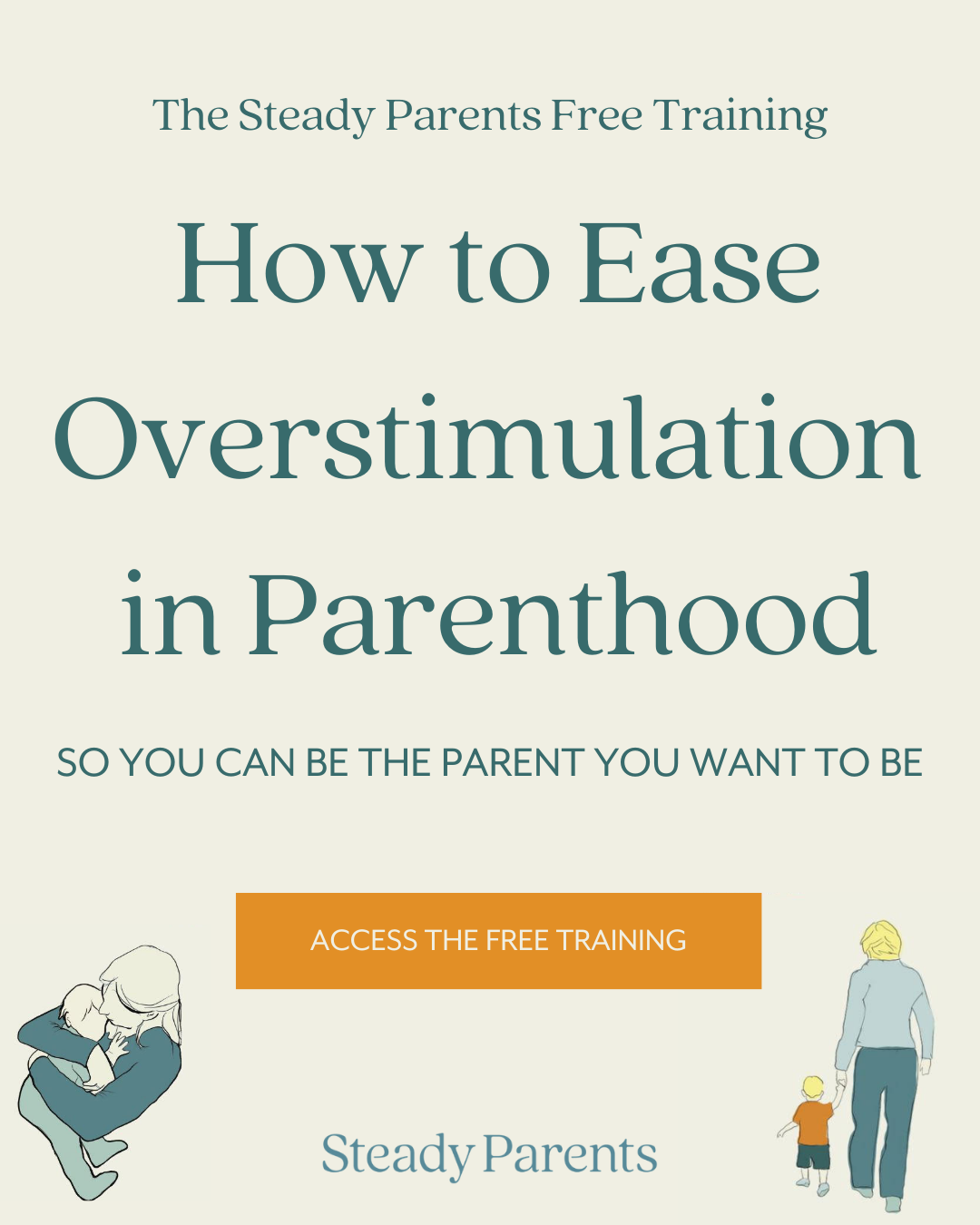Healing Your Nervous System: 10 Tips for Preventing Overstimulation
Keep your toolbox filled with tips for preventing overstimulation in the chaos of parenting.
Life in the modern world can be incredibly stimulating and demanding, often leaving us feeling overwhelmed and frazzled.
For parents, this can be especially challenging, as they juggle the needs of their children with their own well-being. Sometimes we feel that we need to sacrifice our own sensory regulation to help regulate our children but the opposite is true!
In reality, prioritizing our own sensory needs is the best way to help our children learn to manage their own big emotions and feelings.
Afterall, co-regulation goes both ways and our nervous system picks up on cues from other people in our world to know how our nervous systems should be acting in that moment, as I talked about in a previous blog post.
As an occupational therapist and parenting coach, I've seen the toll that overstimulation can take on individuals and families. When you’re overstimulated, everything feels heavier.
The mess in the kitchen.
The laundry that you never put away from three days ago.
The heavy mental load that we carry as mothers.
When you feel like you need a quick reset, it’s important to have tools handy to help reduce the stress on your nervous system. In this blog post, I'll share ten valuable tips for handling overstimulation and nurturing your nervous system for a healthier, more balanced life.
1. Self-Awareness is Key
The first step in managing overstimulation is self-awareness. Take time to recognize your triggers and signs of overstimulation. These may include irritability, fatigue, difficulty concentrating, or physical tension.
Ask yourself:
Did you get enough sleep last night?
Are you hungry?
Is there a triggering noise in the background that you can shut off?
By identifying these cues, you can intervene early and prevent overwhelm. If you’re tired, lay down with your eyes closed for 5-10 minutes. If you’re hungry, grab a filling snack. And for goodness sake, turn off that all those appliances. You can get to those another time!
2. Establish Sensory-Friendly Environments
Create spaces at home that are sensory-friendly for both yourself and your children. This can involve reducing clutter, using soft lighting, and incorporating calming elements like plants or soothing music.
If you’re kids are still young and demanding you to play with them non-stop, pause and find games and activities that feel good for both of you.
Try to avoid games that involve light touch like “hair salon” and instead opt for full-body activities like dancing or jumping.
Playdough, sand, and waterplay are other less active examples of ways you can incorporate sensory activity into your play.
Sensory-friendly environments provide a safe haven when the world becomes overwhelming.
For more ideas on playing with your children when you’re overstimulated, be sure to check out this blog post.
3. Practice Mindfulness and Deep Breathing
Mindfulness and deep breathing exercises can be powerful tools for regulating your nervous system. Bonus points if you can brace yourself against a wall. This added pressure on your body is so regulating.
Teach your children age-appropriate mindfulness techniques to help them manage their emotions as well. These practices can be integrated into daily routines such as before bedtime.
4. Prioritize Sleep
A well-rested body is better equipped to handle stress and overstimulation. Establish a consistent sleep schedule for both you and your children. Create a bedtime routine that promotes relaxation and ensures everyone gets the rest they need.
5. Screen Time Limits
In our digital age, excessive screen time can contribute to overstimulation. Set healthy boundaries on screen time for yourself and your children. Encourage outdoor play, hobbies, and quality family time as alternatives.
This will look different for every family so find a limit and schedule that works best for you and your family.
6. Embrace Sensory Breaks
Sensory breaks are short periods of time where you engage in calming or grounding activities. These breaks can be especially helpful for children with sensory sensitivities. Try activities like swinging, deep pressure activities, or fidget toys.
When you feel the stress and anxiety rising up in your body, walk away from whatever it is that is triggering you, close your eyes, and lean against a wall while taking deep breaths.
7. Move Your Body
I touched on this earlier but movement is not only important for our physical health but for our nervous system health, as well.
Moving your body in nature also has the added benefits of reducing stress because of the serene colors and sounds.
Can’t take a peaceful stroll on your own? No problem! Put the kids in the stroller. The added benefit of heavy work from the weight of their bodies in the stroller or wagon forces our body’s to engage and focus more on the task at hand.
Activating the proprioceptive system through “heavy work,” or moving against resistance, releases serotonin which helps to regulate the nervous system.
Can’t get outside? Put on your favorite song and dance, spin in your office chair, or hang upside down off the edge of your couch. It sounds crazy, I know, but trust me, it works!
8. Healthy Nutrition
A balanced diet can have a significant impact on your nervous system. Reduce consumption of processed foods and prioritize nutrient-rich options and encourage your children to explore a variety of foods for optimal development.
One of my favorite snacks to heal my kids nervous system after an overstimulating day at school is smoothies! Drinking through a straw is an oral motor tool that activates the proprioceptive system, and can be an effective grounding tool to use in the moment of dysregulation.
Using a thick liquid like milkshakes or smoothies is a nice way to add onto that heavy work, but drinking thin liquids through a straw, like water or juice, can also be helpful in calming us down.
9. Develop Routines
Routines offer predictability and stability, which can be soothing for both adults and children. Establish daily routines that include time for self-care and relaxation. Consistency can help reduce the unpredictability of overstimulating situations.
Making decisions, initiating tasks, holding something in your mind…those are all executive functions that can be difficult for parents with a lot on their plate, and especially for those with ADHD. By creating habits, you allow your brain to work on autopilot so you don’t overload your nervous system with cognitive AND sensory demands.
10. Seek Professional Guidance
If you’re struggling with chronic overstimulation and its effects on the nervous system, consider consulting with a healthcare professional or working with an occupational therapist trained in healing your nervous system.
I offer 1:1 coaching for those in need of direct and customized support as well as courses that you can take at your own pace.
Managing overstimulation and healing your nervous system is crucial for your well-being and that of your family.
By implementing these tips and techniques, you can create a more harmonious and balanced life, reducing stress and fostering healthier relationships with your children.
Remember that self-care is not selfish; it's essential for being the best parent and person you can be.
Want to join my email list where I share weekly tips just like this? Fill in your information in the box below!
Pin This For Later:









